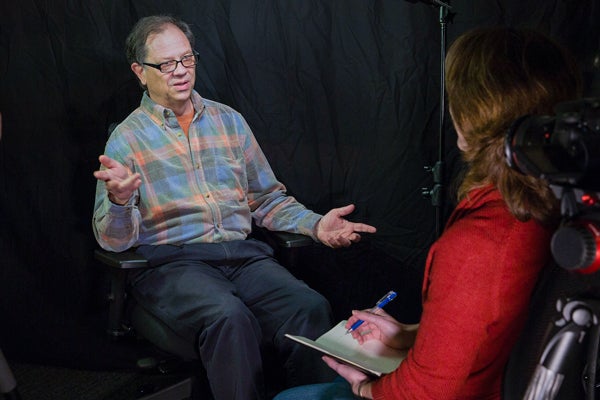|
February 25, 2014
Online and on campus, an innovative educational experience for decision-makers
Worldview Stanford launches The Science of Decision Making, a unique learning experience for professionals that starts online and continues on the Stanford campus. By Nancy Murphy

Neurobiology Professor William Newsome explains how brains process choices during filming for Worldview Stanford's The Science of Decision Making course. (Photo / Farrin N. Abbott)
Stanford has launched a new course on decision-making for professionals, a hybrid experience that combines the technological advantages of online learning with novel experiences and face-to-face conversations with experts on the Stanford campus.
The course was created by Worldview Stanford, a new initiative of the university that creates learning experiences for professionals in business, government and nonprofits to help them get smarter about the issues and dynamics shaping the future.
Worldview builds on Stanford's leadership in interdisciplinary research and online learning to tackle complex topics – from China and climate change to global demography and brain science breakthroughs.
The Science of Decision Making is Worldview Stanford's inaugural offering. The course integrates the latest research in neuroscience, psychology, behavioral economics, business, engineering and other fields. The content examines three broad themes: how we model, influence, and make better decisions, both in theory and in practice. The course, which is limited to 40 participants, opens June 2, 2014, online and culminates with a visit to campus on July 14-17. The cost is $6,500, with discounts for participants from nonprofits and government.
"We chose this as our first topic," said Worldview Director Brie Linkenhoker, "because human decision-making is central to so many endeavors, from marketing and strategic planning to public health and impact investing, to intelligence gathering and diplomacy. But the research is advancing so rapidly that few decision-makers feel like they are keeping up with the science."
The 15 Stanford experts participating in The Science of Decision Making exemplify Worldview's interdisciplinary approach. They include William Newsome, head of Stanford's new neuroscience institute and co-chair of President Obama's BRAIN Initiative; economist Muriel Niederle; cognitive psychologist Brian Knutson; Lindred Greer, an organizational psychologist at the Graduate School of Business; Clint Korver, a venture capitalist and engineering lecturer; David Demarest, Stanford's vice president of public affairs and former communications director for the White House and Bank of America; and Tara VanDerveer, coach of the Stanford women's basketball team.
When participants come to Stanford, they will also have a chance to handle human brains, observe pioneering lab research, "meet" Rodin's The Thinker and visit Google for a discussion on big data and decision-making.
According to Linkenhoker, Worldview Stanford fills a growing need in a world of complexity and information overload. "In my years as a strategy consultant, we often found ourselves scrambling to help clients get up to speed on highly complex, global issues before they could begin to evaluate their strategic options," she said.
By integrating relevant research and insights from Stanford and beyond, Worldview courses enable decision-makers to stretch and deepen their own knowledge of emerging issues. This focus differs from, but complements, other professional and executive education programs at Stanford and elsewhere.
"We concentrate on exploring big-picture topics through an interdisciplinary lens, rather than on mastering technical, management or leadership skills. Both approaches are essential to meet today's challenges." Linkenhoker said.
Worldview Stanford's next two courses are:
The Futures of China to 2025: How might a complex web of social, economic, political and environmental forces and uncertainties shape the future of China – and what will that mean for the rest of the world? (Course opens Aug. 25, 2014; onsite at the Stanford Center at Peking University, Oct. 13-17.)
Environmental Risk and Resilience: What are we learning about rapid environmental changes, their potential risks and impacts, and emerging strategies for mitigation and adaptation? (Course opens Oct. 22, 2014; onsite at Stanford Dec. 8-11.)
-30-
|